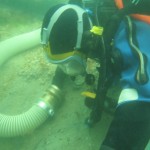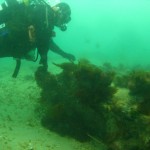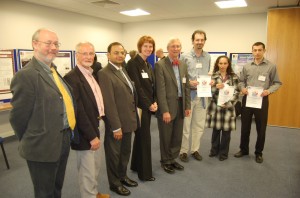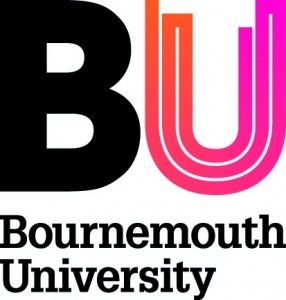LERU presents the views of some of Europe’s leading research-intensive universities as a contribution to the ongoing debate on the simplification of the Framework Programme in this document.
/ Full archive
Vice-Chancellor’s Awards – research project winners!
The Vice-Chancellor’s Awards took place last night and the winner’s of the two research awards were:
Collaborative research / enterprise project of the year: Dr Richard Shipway from the School of Tourism
Research / enterprise project of the year: Design Simulation Research Centre led by Professor Siamak Noroozi from the School of Design, Engineering & Computing
Congratulations to all staff involved! 😀
We will be featuring both of the award winners in future blog posts!
Dave Parham and Paola Palma – Swash Channel wreck
 Dave Parham and Paola Palma (School of Applied Sciences) have been researching the Swash Channel Wreck which lies in approximately 7m of water in the Swash Channel in the approaches to Poole Harbour. The site was discovered as a side-scan sonar anomaly as a result of a geophysical survey conducted by Wessex Archaeology on behalf of Poole Harbour Commissioners and Poole Borough Council. The site has since been designated as a Historic Wreck.
Dave Parham and Paola Palma (School of Applied Sciences) have been researching the Swash Channel Wreck which lies in approximately 7m of water in the Swash Channel in the approaches to Poole Harbour. The site was discovered as a side-scan sonar anomaly as a result of a geophysical survey conducted by Wessex Archaeology on behalf of Poole Harbour Commissioners and Poole Borough Council. The site has since been designated as a Historic Wreck.
 The ship is the subject of a major excavation by BU, supported by English Heritage. It has been dated to around 1630 and includes the earliest ship carvings ever found in the UK, including a mysterious wooden merman, and much of the evidence found on the wreck suggest that it would have been a relatively high status ship for its period.
The ship is the subject of a major excavation by BU, supported by English Heritage. It has been dated to around 1630 and includes the earliest ship carvings ever found in the UK, including a mysterious wooden merman, and much of the evidence found on the wreck suggest that it would have been a relatively high status ship for its period.
 The wreck has been featured on the One Show (6 April 2011) where presenter Dan Snow took part in a dive on the wreck in the mouth of Poole Bay alongside a team of BU Marine Archaeologists, led by Dave.
The wreck has been featured on the One Show (6 April 2011) where presenter Dan Snow took part in a dive on the wreck in the mouth of Poole Bay alongside a team of BU Marine Archaeologists, led by Dave.
 Dave will also feature in the fourth episode of Britain’s Secret Seas, The Bustling South, on 29 May at 8pm on BBC2.
Dave will also feature in the fourth episode of Britain’s Secret Seas, The Bustling South, on 29 May at 8pm on BBC2.
 After conservation, finds from the Wreck and all the information from the excavation will be passed on to Poole Museum Service to be displayed to the community.
After conservation, finds from the Wreck and all the information from the excavation will be passed on to Poole Museum Service to be displayed to the community.
Latest EU funding opportunities in media, sport and GKE
Media Funding
Promoting EU Audiovisual Works
Implementation of Media Pilot Projects
Sport Funding
Preparatory Actions in Sport
Green Knowledge Economy Funding
Assessment of EU Climate Policies
Impact of ICT R&D in Large-Scale Deployment of Electric Vehicles
Communication Campaign on Climate Action & Low-Carbon Society
Competitiveness Eco-Innovation initiative
Clean Sky 9th Call
FP7 Fuel Cells & Hydrogen Joint Undertaking Proposals
Green Knowledge Economy Events
Euroscience Open Forum
Eco-Innovation UK Info Day
FP7 Environment Info Day
trouble accessing UKRO? see our former blog post
PGR Poster Events

Post Graduate Researcher Poster Events
At School level we will shortly be holding a Post Graduate Poster event on the 18th May. This was an initiative that started five years ago following a suggestion from a PGR student representative. Various poster events are organised specifically for PGR only participation, at national level such as the young engineer of the year competition at the Houses of Parliament, at university level organised by the Graduate School and at academic group level such as the new Psychology event. It is worth thinking about these activities and the value to the academic community at various levels.
Our PGR poster event is organised with the help of a small number of staff but the main decision making regarding the format of the event is driven by the PGR community itself. The posters compete for a small cash prize within year groups and are judged externally by invited high-profile industrialists and academics. Participation level has been high during the four events to date and the event ownership for the participating PGR’s has been maintained. External participation to judge the posters has been appreciated by the PGR’s as the economic and practical benefits of research are seen as valued. In addition, the enthusiasm for the research projects from the external competition panel act as a real motivation to students and supervisors. Our key values that keep the poster conference successful are retaining the PRG ownership concerning format and external engagement via the competition judgment of the posters.
Prof Mark Hadfield
Deputy Dean – Research and Enterprise
School of Design, Engineering and Computing
book your place on the BU GrantCraft Research Workshop Day!
 We are delighted to offer a bespoke GrantCraft Research Workshop Day on May 11th 2011, facilitated by Dr Martin Pickard, a specialist in writing and supporting research proposals (particularly EU). Sessions will be held on grant writing skills, impact and benefit, how to write a Marie Curie proposal and the management of EU projects. You can attend as many sessions as you like throughout the day. To read more on each session and to make a booking see our GrantCraft Research Workshop Day Event Page.
We are delighted to offer a bespoke GrantCraft Research Workshop Day on May 11th 2011, facilitated by Dr Martin Pickard, a specialist in writing and supporting research proposals (particularly EU). Sessions will be held on grant writing skills, impact and benefit, how to write a Marie Curie proposal and the management of EU projects. You can attend as many sessions as you like throughout the day. To read more on each session and to make a booking see our GrantCraft Research Workshop Day Event Page.
Researchers of the next generation
Prof Holger Schutkowski, Deputy Dean in the School of Applied Sciences, joined BU in January. Here he provides his thoughts on training the next generation of researchers.
 In a week’s time I will have the great pleasure to open the School of Applied Sciences’ Postgraduate Research Conference. I was delighted that I was asked to give a keynote, not only because it is a nice way of making myself known to students, since I only arrived at BU in January, but also to share some thoughts about the way we do research. Whilst universities require some original research in the final year undergraduate dissertation, and to a much greater extent in Master’s programmes, it is at PhD level where we expect the clear evidence of intellectual independence, of playful recombination of knowledge, which will allow candidates to go beyond current established borders of thought, and to push scientific progress, something that is always happening at the fringes.
In a week’s time I will have the great pleasure to open the School of Applied Sciences’ Postgraduate Research Conference. I was delighted that I was asked to give a keynote, not only because it is a nice way of making myself known to students, since I only arrived at BU in January, but also to share some thoughts about the way we do research. Whilst universities require some original research in the final year undergraduate dissertation, and to a much greater extent in Master’s programmes, it is at PhD level where we expect the clear evidence of intellectual independence, of playful recombination of knowledge, which will allow candidates to go beyond current established borders of thought, and to push scientific progress, something that is always happening at the fringes.
Are we able to give advice? Should we? How can we make this happen? The latest deliberations about the future of current PhD systems and their ever-increasing production of graduates is beginning to raise serious concerns and to elicit calls for reforms, quite drastically, indeed (http://www.nature.com/news/2011/110420/full/472261a.html). Interestingly enough, they emphasise co-operation between institutions (consortia) and cross-disciplinary work.
While the former is already part of the RCUK agenda and is likely to shape the future of PhD funding and recruitment in the UK over the next years, the latter maybe can do with further encouragement. Certainly, one way is to encourage our PhD students to decidedly undertake an interdisciplinary project, which essentially means to embrace the boldness of crossing borders, to work across disciplines and to become acquainted with, adopt and modify interpretive frameworks of other, related or cognate subject areas. Often claimed, rarely done, though; unfortunately a recurring problem and certainly not confined to the fledgling researcher. Another approach is to ensure the research is firmly embedded into a wider and meaningful context, so that these connections across disciplinary borders can be made and the outcomes of the research become accessible and meaningful to the related or cognate subject areas we are trying to include in the first place.
As it happens, this is what I am going to talk about in my presentation, with case studies that necessitate contextualised analysis to demonstrate how we can bring past societies to life through the study of their skeletal remains. But to come back to the state of PhD systems: cross-disciplinary thinking and context awareness is what we want to instil in the researchers of the next generation. But this also requires the intellectual capacity and preparedness for doing so. The students we graduate need to be skilled and prepared for an increasingly competitive job market.
Prof Holger Schutkowski
Deputy Dean
School of Applied Sciences
This week’s large funding pots
 New £550m Green Equipment Funding Scheme Launched by Carbon Trust
New £550m Green Equipment Funding Scheme Launched by Carbon Trust
Worth up to £550 million over the next three years, the dedicated low carbon finance scheme is the first of its kind and will enable UK organisations to invest in cost effective energy efficiency equipment and other low carbon technologies, such as new efficient lighting and biomass heating.
Comic Relief International Grants Programme
Applications can be for up to £1 million and thedeadline for applications is 01.09.11
Bupa Foundation Awards
Now open to entries from clinicians, researchers and health care professionals, recognising excellence. £60,000 will be allocated for completed research and/or development that has been conducted over the past three years. Deadline is 01.07.11
Heritage Grants over £1 Million
The next closing date for applications under the Heritage Lottery Fund’s Heritage Grants Scheme for projects over £1million and under £5million is the 19.06.11
EDF Energy’s Green Fund
The Fund offers grants of up to £30,000 to help cover the cost of renewable energy technology that can be used to produce green energy from renewable sources. The deadline is 31.08.11
Research & Enterprise Bids
I am pleased to report that there has been a rush of research/enterprise bids over the last couple of weeks and a few notable successes. Rudy Gozlan in Applied Sciences and colleagues have submitted a large Erasmus Mundus scheme for over £300k which is great news given BU’s push to increase its European activity. The bid Proving our Value to the SW Forum from Sarah Hean (HSC), Gordon Liu (BS) and Vurain Tabvuma (BS) is also a great example of collaborative working which is fantastic to see. Heather Hartwell, Edwin van Teijlingen, Ann Hemingway, Joanne Mayoh, Ian Jones and Roger Vaughan have collaborated on a bid around male wellbeing to the NIHR Public Health Research; another example of cross BU working. Sarah Cheesman, Gail Thomas, Clive Andrewes, Clive Matthews have put in a bid to the SW SHA for non-prescribed medical training. Jian Zhang has joined a collaborative bid to the AHRC Knowledge Exchange Hub and John Ellis has applied for support from the CIMA Relevance Regained Scheme. All of this activity is fantastic especially the cross BU and EU bids, so good luck to all with your bids!
If we turn to the successful awards there is a host of things from Jon Wardle and CEMP and successful bids in Applied Sciences from Harry Manley and Tim Darvill the latter from the AHRC is particularly notable. Steve Calver, Lisa Stuchberry and Philip Alford have all been successful with bids to Dorset County Council for various projects. The other bid news is the success on the part of Kate Welham, Neil White and Hugh Chignell in receiving support from the AHRC for a block grant to support PhD students over the next three years; this is an outstanding achievement. So congratulations to all concerned on these successful bids!
Matthew Bennett
PVC (Research, Enterprise & Internationalisation)
Using Skype to collaborate!
 Skype is a VoIP (voice over IP) application to enables users to collaborate via a computer interface by calling one another. To use Skype you need to download an install a client application which enables your PC to work as a telephone. You can then make free calls to other Skype users on the network via your PC, regardless of location.
Skype is a VoIP (voice over IP) application to enables users to collaborate via a computer interface by calling one another. To use Skype you need to download an install a client application which enables your PC to work as a telephone. You can then make free calls to other Skype users on the network via your PC, regardless of location.
The benefits for collaboration via Skype rather than conventional telephone calls are:
- longer and more frequent interactions
- free phone calls to other Skype users via computers
- you can record and archive conversations and interview notes
- you can engage in multiuser conversations
- you can make podcasts to share research with others
For information on using Skype check out the Skype website.
If you have used Skype before, comment on this post to let others know about your experiences!
EPSRC grant success for Dr Janet Dickinson (ST)
 Dr Janet Dickinson, based in the School of Tourism, has been awarded £127k from the EPSRC for leading a BU work package as part of the larger collaborative research project 6th Sense Transport (6ST), led by Dr Tom Cherrett (University of Southampton).
Dr Janet Dickinson, based in the School of Tourism, has been awarded £127k from the EPSRC for leading a BU work package as part of the larger collaborative research project 6th Sense Transport (6ST), led by Dr Tom Cherrett (University of Southampton).
6ST aims to revolutionise the process of decision making in travel behaviour (whether it be for the movement of people or things) by using social networking principles to create ‘visibility’ of potential transport options in time and space. If we are better able to visualise the activity of people and things (cars, buses, lorries, even items within a lorry) relative to their immediate and future time schedules, and crucially, the conditions under which people and other ‘things’ might be willing to liaise and adapt, we might be able to realise more opportunistic and collaborative uses for transport resources, leading to a reduction in overall transport related carbon emissions.  6ST will provide a deep understanding of how the increasingly multiple forms of temporality and spatiality influence travel mode choices and the ways in which people and ‘things’ might be willing to share certain personal travel information. This will be achieved through the novel use of smart phone and tagging technology to provide data feeds on activity and availability, monitored through a Platform that will anticipate opportunities for connections that are then made visible to users in the social network. The contribution from Bournemouth University focuses on reducing car dependence at UK tourism destinations. A series of experiments at campsites will explore to what extent the tagging of vehicles linked to dynamic data repositories of tourists daily experiences, needs and desires can break down social barriers and facilitate more cooperation. This enhanced temporal and spatial visibility could lead to better use of public transport, lift sharing to and from attractions, and the co-ordinated movement of ‘things’ (in terms of provisions) required by the collective members of the campsite.
6ST will provide a deep understanding of how the increasingly multiple forms of temporality and spatiality influence travel mode choices and the ways in which people and ‘things’ might be willing to share certain personal travel information. This will be achieved through the novel use of smart phone and tagging technology to provide data feeds on activity and availability, monitored through a Platform that will anticipate opportunities for connections that are then made visible to users in the social network. The contribution from Bournemouth University focuses on reducing car dependence at UK tourism destinations. A series of experiments at campsites will explore to what extent the tagging of vehicles linked to dynamic data repositories of tourists daily experiences, needs and desires can break down social barriers and facilitate more cooperation. This enhanced temporal and spatial visibility could lead to better use of public transport, lift sharing to and from attractions, and the co-ordinated movement of ‘things’ (in terms of provisions) required by the collective members of the campsite.
 6ST seeks to reduce energy consumption and emissions from the transport sector through an increase in adoption of sustainable travel modes and lower carbon travel choices.
6ST seeks to reduce energy consumption and emissions from the transport sector through an increase in adoption of sustainable travel modes and lower carbon travel choices.
User-groups associated with three experimental areas (urban logistics; primary education and tourism) will immediately benefit. In tourism the main beneficiaries are tourists (the end users), but also local transport providers, visitor attractions, local tourism associations and ultimately local residents. The key benefit will be the ability to positively alter transport behaviours (reducing CO2, enhancing quality of life and reducing travel costs). Beyond the timescale of the project (2.5 years), as a growing mass of users participate, there is potential to expand the scale of the impact into other domains (e.g. work, retail travel).
The project is due to start in August 2011 and has a total award value of £730k.
 Dr Janet Dickinson will be leading the research at BU together with four partners (University of Southampton, University of Lancaster, Edinburgh College of Art and the University of Salford). Janet’s research is currently focused on the role of time in the consumption of tourist travel and the ‘slow travel’ concept.
Dr Janet Dickinson will be leading the research at BU together with four partners (University of Southampton, University of Lancaster, Edinburgh College of Art and the University of Salford). Janet’s research is currently focused on the role of time in the consumption of tourist travel and the ‘slow travel’ concept.
REF event 19 & 20 May 2011 – REGISTRATION IS OPEN!!
 BU is hosting a two-day REF event on Thursday 19 and Friday 20 May 2011. All staff are invited to attend.
BU is hosting a two-day REF event on Thursday 19 and Friday 20 May 2011. All staff are invited to attend.
The event is of interest to BU academic staff and anyone who will be involved in the BU submission to the REF.
There will be three separate sessions:
Session 1
Thursday 19 May 9am-2pm
This session will be open to BU staff and external delegates.
There will be presentations from the REF team at HEFCE, REF impact pilot panel members, and a REF impact pilot institution (University of Plymouth).
Session 2
Thursday 19 May 2pm-5pm
This session is only open to BU staff.
This session will provide BU staff with the opportunity for internal networking, followed by a demonstration of BU’s new publications management system and a presentation on preparing a publication profile for the REF.

Session 3
Friday 20 May 9:45am-4:30pm
This session is only open to BU staff.
The focus of this session is the development of the BU impact case studies. There will be presentations of the impact case studies being developed at the moment.
All sessions will take place in Kimmeridge House and Poole House, Talbot Campus.
You must register separately for each session you will be attending.
See our previous REF Event blog post for further details. The provisional programmes are available on the registration forms (see links above).
AHRC Block Grant – awarded!
 I am delighted to tell you that BU has been awarded the AHRC Block Grant Partnership: Capacity Building Scheme grant that we applied for early this year. The final numbers are given below:
I am delighted to tell you that BU has been awarded the AHRC Block Grant Partnership: Capacity Building Scheme grant that we applied for early this year. The final numbers are given below:
Archaeology – 2x PhD studentships (one for 2012 and one for 2013)
Film, Digital and Media Production – 1x PhD studentships (one for 2011) and 4 professional Preparation Masters (2 in 2011, 1 in 2012 and 2013)
History – 1x PhD studentships (one for 2011)
This is a fantastic achievement and many congratulations are due to everyone. This was a collaborative venture between Applied Science and the Media School led by Kate Welham, but thanks are also due to the whole team: Neil White, Fiona Knight, John Fletcher and Hugh Chignell. Not only is this a great illustration of the power of cross School collaboration but significantly allows us to apply for further block grants down the line. Fantastic stuff!!!!!
Matthew Bennett
PVC (Research, Enterprise & Internationalisation)
Learning from someone who is learning themselves
It’s early the day after Easter Monday and I am sitting in the office looking out at the view as the haze clears and another fresh spring day dawns. Yes all very poetic! I have in fact spent much of the weekend looking at the view while spending the mornings working hard on a conference paper for later this week – I am a keynote speaker at a primatology conference this week. I also have a big project meeting attached to the conference since I am now one year into my current NERC project and it’s about time that we started to have something to show for it! I have been running this really cool computer code in MATLAB to generate some new data which was written by some colleagues in Liverpool. It takes an individual footprint – in this case some from Namibia – and translates, transforms and superimposes it on others to create a mean footprint. So for example if you have a trail of ten prints then instead of trying to interpret all ten individually you can focus on the mean. It is a great way forward since intra-trail variability is a key problem in making inferences from ancient footprint trails. Took me a while to master MATLAB – well master is a bit of an overstatement, at least get it to work! But once I got it working I could set the code running to process data in batches, time consuming but the results are great. This whole process has set me thinking about the fact that doing research is really about life long learning – learning new stuff whether it be concepts, software or skills – and that is what is fantastic about being an academic and makes the profession one that I feel privileged to be part. Sharing this with students and giving them the skills and enthusiasms for a life time of learning is also one which is cool. A week Wednesday is the BU Education Enhancement Conference; I am down to talk about research informed education something which I feel very strongly about. I have to write the talk yet, but for me the key is the fundamental idea of ‘learning from someone who is learning themselves’. I really like this concept and when people ask what research has to do with a good student experience I think the answer is summed up by this phrase and in the simple idea of passing on ones own wonder at new knowledge and learning!
book now for the BU GrantCraft Research Workshop Day!
 We are delighted to offer a bespoke GrantCraft Research Workshop Day on May 11th 2011, facilitated by Dr Martin Pickard, a specialist in writing and supporting research proposals (particularly EU). Sessions will be held on grant writing skills, impact and benefit, how to write a Marie Curie proposal and the management of EU projects. You can attend as many sessions as you like throughout the day. To read more on each session and to make a booking see our GrantCraft Research Workshop Day Event Page.
We are delighted to offer a bespoke GrantCraft Research Workshop Day on May 11th 2011, facilitated by Dr Martin Pickard, a specialist in writing and supporting research proposals (particularly EU). Sessions will be held on grant writing skills, impact and benefit, how to write a Marie Curie proposal and the management of EU projects. You can attend as many sessions as you like throughout the day. To read more on each session and to make a booking see our GrantCraft Research Workshop Day Event Page.
International funding opportunities released this week
EC Funding to Improve the Energy Efficiency of Public Buildings
The 5th Call for Proposals under its ITC-PSP programme is now open for applications; it aims to stimulate innovation and competitiveness through wider uptake and best use of ICT by citizens, governments and businesses. Deadline 01.06.11
Funding to Find European Project Partners
Grundtvig funds training opportunities for training, or to meet partners prior to submitting a Grundtvig Partnership or Senior Volunteering application, or to attend a Contact Seminar to find new partners can now apply for preparatory visits funding which will allow one person to visit prospective partners. Applications are accepted throughout the year on a rolling basis. You will need to submit your application no later than 8 weeks before a planned visit.
DEFRA Funding for International Biodiversity Projects
Funding applications are currently being invited under round 18 of the Darwin initiative which offers funds to encourage the sharing of UK biodiversity expertise with local partners in countries with a wealth of biodiversity, but who lack the means to protect these resources and to assist in meeting their international biodiversity commitments. Deadline 20.06.11
BU Research opinion polls!
You may have noticed our new opinion poll section on the BU Research Blog homepage.
 We are interested to know what you think about RESEARCH – whether that’s research at BU, the external research environment, good practice for undertaking research, particular research projects… Basically anything to do with research!
We are interested to know what you think about RESEARCH – whether that’s research at BU, the external research environment, good practice for undertaking research, particular research projects… Basically anything to do with research!
Responding to the poll takes seconds and responses are anonymous. Once you have responded to the poll you can see how other BU staff have also responded!
Once a poll has finished we will be writing a blog post about the results. Depending on the poll question, the results could impact on how we manage and administer research at BU in future.
 We will be changing the poll question every few weeks. The first poll is now up and running and asks whether journal impact factors are a good indicator of quality.
We will be changing the poll question every few weeks. The first poll is now up and running and asks whether journal impact factors are a good indicator of quality.
If you would like to suggest a topic/question to be added to the poll then let us know by commenting on this blog post!
To read more about journal impact factors, read Anita’s excellent post on impact factors.
How KTPs helped Dorset Cereals quadruple in size
Dr Martyn Polkinghorne added an excellent post a couple of weeks ago about Knowledge Transfer Partnerships (KTPs). Following on from this David Kilburn, Head of Business Development and Associate Professor (Enterprise) in the School of Tourism, has added this post about how KTPs with BU helped local SME Dorset Cereals.
I have been involved in KTP schemes for about 8 years and during that time I have written 11 successful 2 year classic schemes and 6 short KTP schemes.
 Basically the KTP scheme is a partnership between BU and a company whereby knowledge is transferred both ways – from the university to the company and vice versa. An Associate – a graduate from anywhere in the world – is employed for 2 years on average and has 2 supervisors, 1 from BU and 1 from the company.
Basically the KTP scheme is a partnership between BU and a company whereby knowledge is transferred both ways – from the university to the company and vice versa. An Associate – a graduate from anywhere in the world – is employed for 2 years on average and has 2 supervisors, 1 from BU and 1 from the company.
The Associate also receives structured training and development on quarterly training days set up by the funding body, Momenta.
Seven of the classic KTP schemes have been with food related companies such as Dorset Cereals (2), Fudges Bakery, Chococo, Olives Et Al, Cowdry’s Bakery, Sandridge Farmhouse Bacon and Sun Cottage Wholefoods.
All of the above KTP schemes have been successful but the double scheme at Dorset Cereals was particularly successful and quadrupled the business within two years.
There now follows a more detailed overview of the Dorset Cereals success story.
Dorset Cereals is now the UK’s leading provider of muesli following the successful completion of two Knowledge Transfer Partnerships with Bournemouth University.
The Dorchester-based company, which produces flakes, granola, porridges, bars and slices as well as muesli, hired University graduates to help develop its marketing and production functions. And on the back of Bournemouth University’s support Dorset Cereals has nearly quadrupled the size of its business.
When Managing Director Peter Farquhar arrived at Dorset Cereals in 2005 there was no marketing function – and having seen a story about another company which had worked with the University on a knowledge transfer programme and received an emarketing mail shot from David Kilburn, Head of Business Development, Mr Farquhar got in touch with David at Bournemouth’s School of Services Management (now the School of Tourism). “We had an outrageous plan that would see us become the UK’s leading muesli provider and together with the University we identified two big gaps that needed plugging,” he said. “One was around the relationship with our consumers, particularly the website, where we had no expertise in the business, and the second was around production capacity and processes which we needed to change to meet the planned volume growth.”
 Bournemouth University graduate Harriet McKay – who has since been appointed as the company’s Communications Manager – was brought in to deliver the marketing support. “When I started, the website was plain and there was absolutely no reason for customers to come back to the site,” Harriet explained. “I worked with the team at Dorset Cereals and their design agency to create a new website that would create more visits and importantly communicate their brand values. Before the University’s involvement the company had 16,000 emails on its database, now we have over 200,000. It’s been a fantastic success story.”
Bournemouth University graduate Harriet McKay – who has since been appointed as the company’s Communications Manager – was brought in to deliver the marketing support. “When I started, the website was plain and there was absolutely no reason for customers to come back to the site,” Harriet explained. “I worked with the team at Dorset Cereals and their design agency to create a new website that would create more visits and importantly communicate their brand values. Before the University’s involvement the company had 16,000 emails on its database, now we have over 200,000. It’s been a fantastic success story.”
The company, which had access to University academic expertise around web marketing and database development, also commissioned a second knowledge transfer programme to up production targets. “We brought in new equipment and employed new staff, but ultimately we needed to change the way we worked on the factory floor and the University helped us to improve our production capacity and processes,” Mr Farquhar said. “The University’s involvement has been pivotal to our successes – frankly we couldn’t have got to the stage we are without the involvement of Bournemouth’s staff and students.”
 Dr Martyn Polkinghorne, Bournemouth University’s Knowledge Transfer Programmes Centre Manager, said the partnership with Dorset Cereals was a good example of what the University can bring to business. “Businesses should be more aware that universities have the capability to make a direct impact on their bottom line, as we have in this case. Here at Bournemouth we have particular expertise in supporting the food and drink sector, as well as many other key specialisms which firms are tapping into.”
Dr Martyn Polkinghorne, Bournemouth University’s Knowledge Transfer Programmes Centre Manager, said the partnership with Dorset Cereals was a good example of what the University can bring to business. “Businesses should be more aware that universities have the capability to make a direct impact on their bottom line, as we have in this case. Here at Bournemouth we have particular expertise in supporting the food and drink sector, as well as many other key specialisms which firms are tapping into.”
David Kilburn
Associate Professor Enterprise
Head of Business Development
School of Tourism
For further information on KTPs, view the following webpages:
- Previous BU Research Blog post – What is a KTP?
- The KTP webpages on the BU Business Services website (includes other KTP success stories)
- The KTP webpages on the BU Enterprise Intranet (staff only)
- The national KTP website














 Connecting Research with Practice: FoodMAPP Secondment in Austria and France
Connecting Research with Practice: FoodMAPP Secondment in Austria and France Health promotion paper read 8,000 times
Health promotion paper read 8,000 times The Beautiful Work Challenge: On Birth
The Beautiful Work Challenge: On Birth Free event on Solutions to Inequalities in Dementia Diagnosis and Care
Free event on Solutions to Inequalities in Dementia Diagnosis and Care MSCA Postdoctoral Fellowships 2025 Call
MSCA Postdoctoral Fellowships 2025 Call ERC Advanced Grant 2025 Webinar
ERC Advanced Grant 2025 Webinar Horizon Europe Work Programme 2025 Published
Horizon Europe Work Programme 2025 Published Horizon Europe 2025 Work Programme pre-Published
Horizon Europe 2025 Work Programme pre-Published Update on UKRO services
Update on UKRO services European research project exploring use of ‘virtual twins’ to better manage metabolic associated fatty liver disease
European research project exploring use of ‘virtual twins’ to better manage metabolic associated fatty liver disease